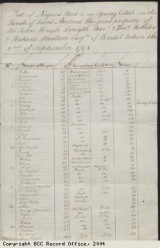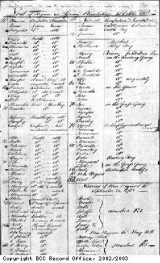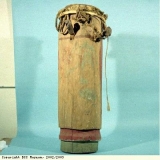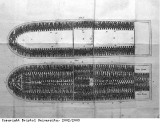Identity and roots
The experience of the transatlantic slave trade took the enslaved Africans away from their roots. There was a conscious effort by the slave owners to remove the identity of the slaves. Often they went on board a slave ship naked, with no belongings from their previous life. All they had of their life before slavery was carried in their heads, as memory of customs, beliefs, the words of songs and stories, their language. The slaves on a ship would not be from one place or ethnic group, speaking one language and with one culture. They would be a mixed group, purchased from different places around the west coast of Africa and from different traders. They would be from different ethnic groups, and speak different languages. They would have different beliefs and cultures.
European plantation owners would be keen to keep this mix of ethnic groups, so that the slaves on their plantation would find it harder to come together and plot against their owners. Plantation owners also continued the attempt to blot out the African identity of their slaves. Slaves might keep an African name, like Quaco, but often they were given a new name like Venus or Betty, or Hercules or Johnny (pictured here is a list of slaves from the Spring plantation in Jamaica, which shows the classical European names given to many enslaved Africans). Old customs were often discouraged. On the Caribbean island of St Kitts drumming was banned except for a short time at Christmas, for example. Despite such discouragement, the slaves did create a new ‘Creole’ culture. This culture, formed by Africans in the Americas, was a mix of the cultures and beliefs of the different ethnic groups, sometimes adding in European and Christian ideas. This Creole culture has evolved over time and is still important throughout the Diaspora.
Plantation owners often used Christianity as a way of keeping slaves in their ‘place’. The Christian message could be interpreted as one of obedience to the social order. The poor and disadvantaged Christian was offered the reward of everlasting life in Paradise when they died. However, not all plantation owners encouraged the spread of Christianity amongst their slaves, as the slaves might interpret the Christian message as one of freedom and equality. Preachers who worked with slaves on the plantations were often accused of stirring up rebellion amongst their congregations. The Baptists especially were seen as encouraging slaves to question their status, and being behind the ‘Baptist War’ of 1831 on Jamaica. This rebellion was planned by Sam Sharpe, a slave who was also a Baptist lay preacher. He ‘learnt from his Bible, that the whites had no more right to hold black people in slavery, than the black people had to make the white people slaves…’. Christianity, however, was often preferred by the plantation owners to what they saw as the ‘heathen’ gods of Africa.






